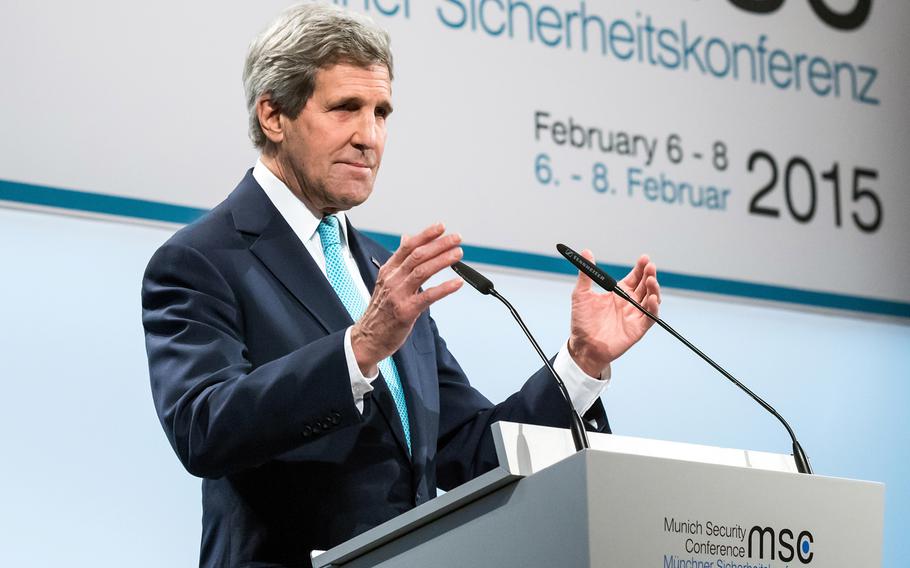
U.S. Secretary of State John Kerry speaks at the Munich Security Conference on Feb. 8, 2015. (Munich Security Conference)
MUNICH, Germany — The threat of the Islamic State group in Syria and Iraq, Boko Haram in Africa and other extremist groups around the world will not be defeated on the battlefield alone, but in classrooms and community centers as part of a fundamental societal change, U.S. Secretary of State John Kerry and other leaders concluded Sunday at the end of a conference here on global security issues.
The quest for peace in Ukraine and how to contain Russia dominated discussions among political leaders and security experts at the three-day annual Munich Security Conference. However, a key theme throughout was the idea of a global order under threat, with instability flaring also in Syria, Iraq, Libya and west Africa, where Boko Haram has posed a growing threat.
“There is no question we are in the midst of a defining moment. We are facing multiple tests,” Kerry said. “One is taking center stage right here in Europe. The other one has its roots beyond our borders. Both test the global order we have been spending the last 70 years trying to maintain.”
In the battle against the Islamic State group, which now occupies parts of Syria and Iraq with the aim of establishing a Caliphate, the U.S. has conducted some 2,000 airstrikes against militants and killed half the group’s senior leaders, Kerry said.
But over the long-term, the battle against violent extremism will require a global effort focused on more than military measures.
“We cannot lose sight of the fact that this effort is only the beginning,” Kerry said. “We cannot just work to put out fires Daash and other groups are igniting in the region and around the world,” he said, using the Arabic acronym for the Islamic State group. “We have to actually prevent the ignition of those fires in the first place. That means the fight against violent extremists is not going to be fought on the battlefield. It’s going to be fought and won in classrooms, in workplaces, houses of worship, community centers, urban street corners and halls of government.”
An intentional effort, focused on promoting economic and educational opportunities and rule of law will be central to any effort, Kerry said.
“We have to address the intolerance, economic hopelessness and exclusion in some of our societies” Kerry said. “We have to create alternatives to violent extremism in countries where it is prevalent.”
If not, he said, in five or 10 years, others would be grappling with the same challenges, though the terrorist groups “may have different acronyms by then and they may be targeting different countries.”
Sen. John McCain, R-Ariz., chairman of the Senate Armed Services Committee, took a harder line, saying the U.S. and its allies must hit back hard at those who would undermine the world order. He advocated arming Ukrainian troops fighting Russian-backed separatists and giving more support to moderate forces in Syria.
“It’s not that we are doing nothing, it’s that nothing we are doing has been sufficient,” McCain said. “If we do not change course, the liberal world order we have so painstakingly built will continue to deteriorate.”
However, French Foreign Minister Laurent Fabius cautioned that forecasting the future is not so easy.
“Last year, in spite of our common, profound expertise, our conference did not really see Ebola, Daash and the Ukrainian war,” he said. “It means we have to be humble in our analysis and our forecasts.”
Today’s world is chaotic, violent and unpredictable, he said. Going forward, allies will need to remain united in the face of such diffuse threats. “We all know the threat is global, and so must (be) the response,” Fabius said.
Gen. Philip Breedlove, supreme allied commander of NATO, said he saw a strong sense of purpose among those in attendance after the first day of discussions.
“I’m encouraged by the many ideas I’ve heard here,” Breedlove said in an email. “Overall, I’m picking up a genuine sense of momentum and recommitment to the types of cooperation that are so essential to our security. The alliance is as united as it’s ever been.”